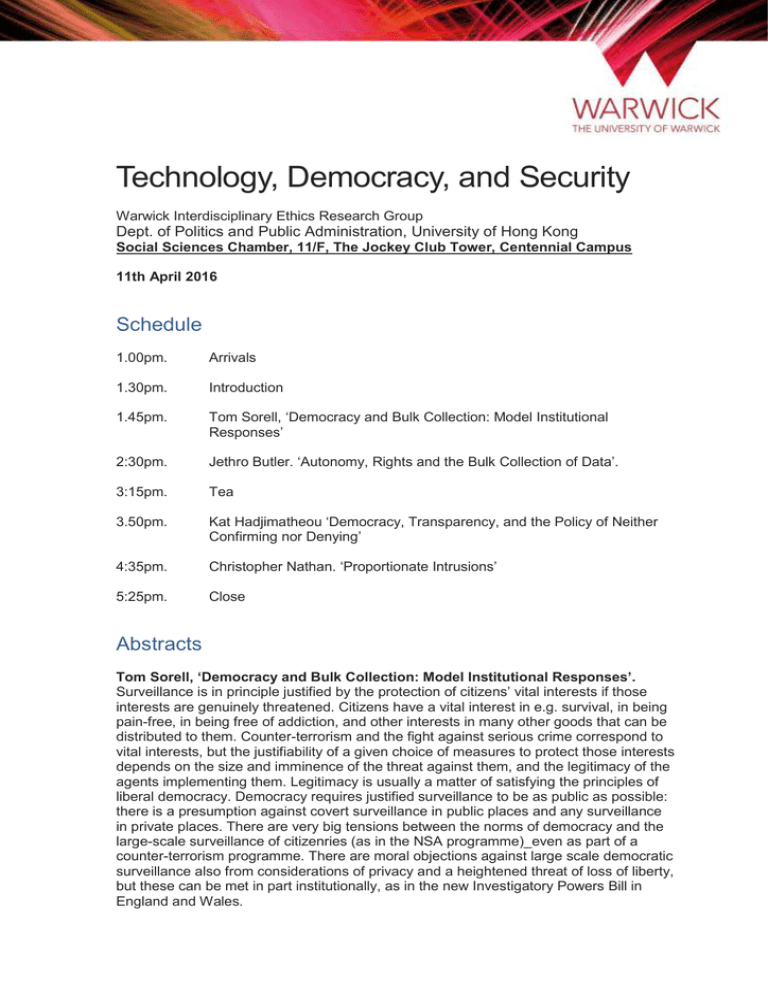Technology, Democracy, and Security Schedule
advertisement

Technology, Democracy, and Security Warwick Interdisciplinary Ethics Research Group Dept. of Politics and Public Administration, University of Hong Kong Social Sciences Chamber, 11/F, The Jockey Club Tower, Centennial Campus 11th April 2016 Schedule 1.00pm. Arrivals 1.30pm. Introduction 1.45pm. Tom Sorell, ‘Democracy and Bulk Collection: Model Institutional Responses’ 2:30pm. Jethro Butler. ‘Autonomy, Rights and the Bulk Collection of Data’. 3:15pm. Tea 3.50pm. Kat Hadjimatheou ‘Democracy, Transparency, and the Policy of Neither Confirming nor Denying’ 4:35pm. Christopher Nathan. ‘Proportionate Intrusions’ 5:25pm. Close Abstracts Tom Sorell, ‘Democracy and Bulk Collection: Model Institutional Responses’. Surveillance is in principle justified by the protection of citizens’ vital interests if those interests are genuinely threatened. Citizens have a vital interest in e.g. survival, in being pain-free, in being free of addiction, and other interests in many other goods that can be distributed to them. Counter-terrorism and the fight against serious crime correspond to vital interests, but the justifiability of a given choice of measures to protect those interests depends on the size and imminence of the threat against them, and the legitimacy of the agents implementing them. Legitimacy is usually a matter of satisfying the principles of liberal democracy. Democracy requires justified surveillance to be as public as possible: there is a presumption against covert surveillance in public places and any surveillance in private places. There are very big tensions between the norms of democracy and the large-scale surveillance of citizenries (as in the NSA programme)_even as part of a counter-terrorism programme. There are moral objections against large scale democratic surveillance also from considerations of privacy and a heightened threat of loss of liberty, but these can be met in part institutionally, as in the new Investigatory Powers Bill in England and Wales. Jethro Butler. ‘Autonomy, Rights and the Bulk Collection of Data’. Bulk collection is often presented as a threat to privacy but less often noted is the potential that bulk collection has to undercut the liberty and autonomy of individual citizens. Insofar as liberty and autonomy are fundamental values in liberal-democratic states the use of bulk data collection may present an ethical problem. This paper explores the extent to which different employments of bulk collection might infringe on various autonomy or liberty-based rights possessed by citizens in liberal democratic states. Kat Hadjimatheou. ‘Democracy, Transparency, and the Policy of Neither Confirming nor Denying’. The use by citizens and journalists of freedom of information powers has expanded in recent years. So too has the incidence of data holders responding to such requests by neither confirming nor the existence or content of information specified. This paper considers the issues surrounding the question of whether neither confirming nor denying is a legitimate strategy in a democracy. Christopher Nathan. ‘Proportionate Intrusions’. Under what conditions can police and security services justifiably intercept messages and calls, examine internet connection records, deploy undercover officers, or hack encrypted communications? It is generally agreed that intrusions should always be proportionate. But proportionality is a poorly understood idea in public discourse. Surprisingly, the legal concept of proportionality in this area often does not formally give to innocent but useful targets the extra protections that popular opinion would expect. In this paper I examine the reasons for this, and how we might give innocence and responsibility their proper place.




